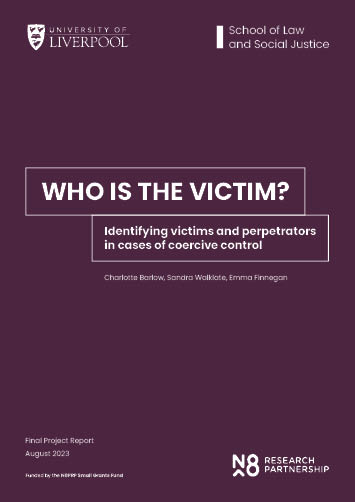Domestic abuse (DA) is a key priority for all UK-based police forces with the Domestic Abuse Act (2021) adding emphasis to this. However, the gender-neutral assumptions underpinning this Act and other existing DA legislation stands in stark contrast to the extensive evidence base highlighting the gendered nature of domestic abuse. This gender-neutral approach to the law has particular significance for coercive control which has been evidenced as a highly gendered crime.
Police officers are required to respond to DA in this difficult legal context which can create various challenges. Specifically, when gendered understandings of DA and coercive control are not explicit in official legislation, identifying the primary perpetrator and victim can be rendered more difficult, particularly as perpetrators of coercive control can be highly manipulative in presenting the circumstances of their behaviour.
The project, awarded £24.2k from the N8 Policing Research Partnership as part of the N8PRP Small Grants Fund, partnered with Lancashire Constabulary, and supported by Merseyside Police, Cleveland Police, Cumbria Police, West Yorkshire Police, and the College of Policing.
This project endeavoured to address this gap in knowledge in support of the key N8 PRP priorities of understanding the operationalisation of vulnerability, victim engagement, and support.
The project, led by Professor Sandra Walklate, Eleanor Rathbone Chair of Sociology, University of Liverpool, as Principal Investigator; Dr Charlotte Barlow, Reader in Criminal Justice and Policing, UCLAN; and Dr Emma Finnegan, Research Assistant, ran from April 2022 to September 2023.
Several general observations can be made based on this report. The research pointed to the ongoing presence of stereotypes surrounding the ‘ideal’ victim and what ‘real’ victim behaviour might look like. Both concerns were referred to by the victim-survivors who took part in this study. However, the issue of misidentification of the primary perpetrator did not emerge as an issue in the same way as it has in other jurisdictions, such as Australia.
The case file analysis and police officer testimonies talk of the need to ‘dig deeper’ [using professional judgement] in cases of coercive control, and officers also expressed informed awareness of the manipulative abilities of perpetrators. However, the victim-survivors interviewed highlighted issues with police offices understanding and identifying them as the primary victim, largely due to conceptions of ‘ideal victimhood’ and systems abuse by the perpetrator.
Victim-survivors highlighted issues with communication in the policing response. The victim-survivors interviewed in this project were not always aware of the rationale behind police’s response to them, which might be a point of contact open for further improvement.
Recommendations arising from this small-scale study, in policing practice the findings called for clearer communication between the frontline officer and the victim-survivor on why action is taken and/or why action is not taken, as this would be beneficial to the victim-survivor. This may also improve willingness to contact the police on a future occasion if needed. In policing domestic abuse policy, concerns were raised by policing respondents in relation to the value of DASH (Domestic Abuse, Stalking, Harassment and Honour Based Violence Assessment) in relation to high-risk cases, there is arguably a need to assess the efficiency of DARA (Domestic Abuse Risk Assessment) in such cases, as it is more widely introduced across England and Wales.
This work also points to the need for academic research focussed on policing domestic abuse to take a closer look at ‘positive policing’ and practices of safeguarding, in a bid to move away from the focus on arrest and non-arrest in cases of domestic abuse and/or coercive control.
Report
- Read the Who is the Victim Report (PDF) report

Back to: Department of Sociology, Social Policy and Criminology
